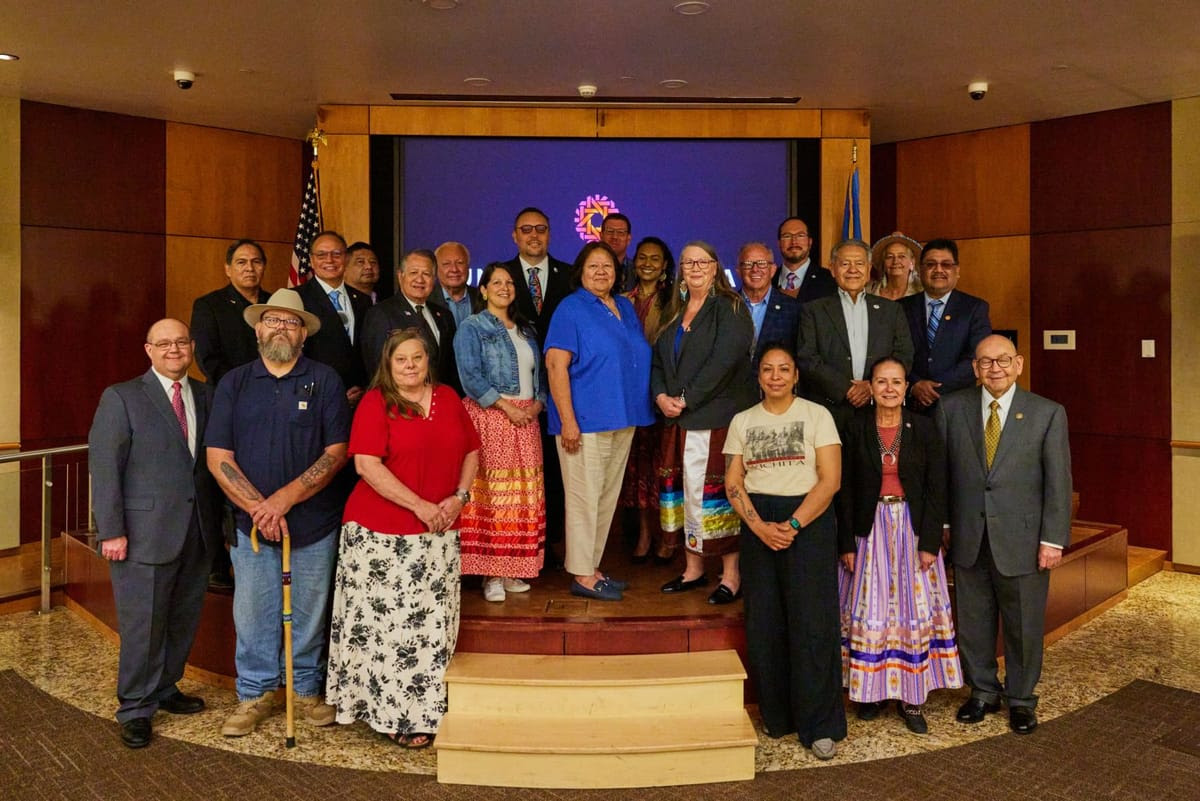
- Details
- By Native News Online Staff
In 2023, Oklahoma’s tribal nations contributed $23.4 billion to the state’s economy, according to a newly released study.
The findings, commissioned by United for Oklahoma and the Oklahoma Indian Gaming Association, were unveiled by tribal leaders at the Oklahoma History Center. The report highlights the most significant growth in economic impact among the years studied. From fiscal year (FY) 2019 to FY 2023, tribal economic activity increased by $4.9 billion—nearly double the growth seen between FY 2017 and FY 2019.
According to the study, tribal nations directly employed over 55,600 Oklahomans and supported a total of 139,860 jobs, benefiting both tribal citizens and non-citizens. In total, these jobs generated more than $7.8 billion in wages and benefits for Oklahoma workers in 2023.
“The contributions of tribal nations to the Oklahoma’s success are substantial and enduring,” said Matt Morgan, Chairman of the Oklahoma Indian Gaming Association (OIGA). “Through our business enterprises and healthcare facilities, we support jobs in rural areas where economic opportunities are often limited. Tribal impact reaches far beyond employment. We invest in infrastructure, fund healthcare, champion public education and deliver programs that meet critical community needs. We honor the legacy that brought us here and remain focused on building a bright future for all Oklahomans.”
The report highlights significant tribal contributions to healthcare, public education and workforce development in 2023:
- Tribes spent $582 million providing health services to Oklahomans with over 3.5 million unique patient visits.
- Through gaming compacts between tribal governments and the state, tribes submit a percentage of their Class III gaming revenues for the exclusive right to operate gaming in the state. In 2023, tribes sent $208 million in exclusivity fees to the state – a 36% increase since 2019. More than $177 million of the fees went to fund public education across Oklahoma.
- When combined with the education portion of exclusivity fees, tribes delivered $351 million for Oklahoma education programs in 2023.
The study was conducted by Dr. Kyle Dean, Professor of Economics and Director of the Center for Native American and Urban Studies at Oklahoma City University, who analyzed data provided by 19 Oklahoma-based tribal nations.
“Tribal nations serve as a significant economic force, consistently contributing to the state’s economy with increasingly transformative impact,” said Dr. Dean. “With over 100,000 jobs supported and an ever-expanding scope of investments, tribes help build sustainable economies and stronger communities across the state.”
More Stories Like This
Native News Weekly (August 25, 2024): D.C. BriefsNavajo Nation Mourns the Passing of Former Vice President Rex Lee Jim
Deb Haaland Earns Endorsement From Communications Workers of America Local 7076
University Soccer Standout Leads by Example
Two Native Americans Named to Democratic Congressional Campaign Committee's“Red to Blue” Program
Help us defend tribal sovereignty.
At Native News Online, our mission is rooted in telling the stories that strengthen sovereignty and uplift Indigenous voices — not just at year’s end, but every single day.
Because of your generosity last year, we were able to keep our reporters on the ground in tribal communities, at national gatherings and in the halls of Congress — covering the issues that matter most to Indian Country: sovereignty, culture, education, health and economic opportunity.
That support sustained us through a tough year in 2025. Now, as we look to the year ahead, we need your help right now to ensure warrior journalism remains strong — reporting that defends tribal sovereignty, amplifies Native truth, and holds power accountable.
 The stakes couldn't be higher. Your support keeps Native voices heard, Native stories told and Native sovereignty defended.
The stakes couldn't be higher. Your support keeps Native voices heard, Native stories told and Native sovereignty defended.
Stand with Warrior Journalism today.
Levi Rickert (Potawatomi), Editor & Publisher


